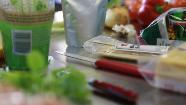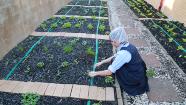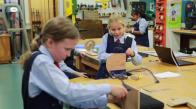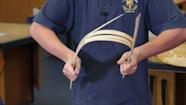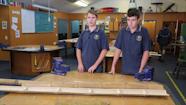Ann Davis talks about the process she followed with the Gisborne District Council to acquire registration for her business.
Food safety in a local environment – Hinterland Express Old Cottage Cakery
Transcript
Ann Davis: I realised I needed to have a registered kitchen and we had this old cottage here. I decided that maybe I would look into doing something with it and making it into a kitchen, because I’ve always been keen on cooking. I went to the council in Gisborne and a man named Suman Lal he said "Oh I’ll come up and have a look and to see what you need to do" and he came and he was absolutely wonderful and there was, the cottage wasn’t a bad state of disrepair really, it needed a lot of work doing to it. But he said I could do it really cheaply by replacing the covering on the floor, making sure it sort of went up the walls so far and painting so that surfaces were easy to wipe down and I could use a domestic oven, my hot water had to be really hot, I didn’t need at that point to have a dishwasher and yeah, he came back after a month or six weeks and my husband and I had actually worked and we’d painted and we’d put the floor covering down and we’d done everything he’d asked us to do and he said yeah, I could start a business.
I have to submit an application for a license each year to the Gisborne district council. Someone from the council comes up and inspects the cottage, talks to me about the temperatures in the fridges. As I come in every morning I check the temperatures in the freezers and the fridges and the hot water that comes out of the tap, and it all goes down into this food control plan and when the inspectors from the Gisborne district council come up, which are environmental health, they check the book in to see that I’m complying with the license rules really, regulations.
The cottage I need to have a cleaning plan, which I have here and as it’s really just me who works here 99 percent of the time, the council I mean, they’re very good because they know that I’m not going to put my business at risk by not complying, or by not keeping things clean, by not keeping my temperatures correct. Because we’re on tank water here we need to be very vigilant about the amount of bug that maybe in the tanks. Our water is actually very, very clean, but because we have birds in trees there could be a problem with bugs getting into the water supply. So we do treat the water with aquatabs and we put in say two aquatabs to 5 thousand gallons of water. The council when they come up they always take a water sample and if there is a problem they write me a letter and advise me on how to control that problem. But there’s been nothing serious and I am very vigilant about the water.
Related videos
Real food, real fast (02:35)
Students were set a brief to develop a faster, fresher, healthier takeaway based on an analysis of a traditional recipe....
A food bag for a family dinner (03:31)
With a focus on using seasonal produce and their families as stakeholders, students produced great recipes and food bags for a family dinner....
My context and issue (04:57)
Year 13 students share about the contexts and issues they have chosen in their food technology programme.
Engaging contexts in product design (03:09)
Abby Dingle discusses materials and tools that engage students in product design.
Combining knowledge and practice (01:58)
Steve Andrew explains how understanding materials is essential for effective technological practice.
Linking hands-on experiences and understandings (03:54)
Hands-on experiences allow the students to see materials understandings in action.
Play, experiment, explore (02:55)
Steve Andrew lets the students see, feel, and play with products to develop their understandings in materials.
Finding materials to meet the specs (02:36)
Steve Andrew shares how students identify material specifications in a brief and then test materials to find those that are suitable....
School–industry relationship cuts both ways (03:36)
Steve Andrew and Terry Rillstone describe the way the relationship between St John's College and The Shop has benefits for them both....
Pushing the boundaries with materials (02:53)
Steve Andrew describes how his senior students have the confidence to select and work with unfamiliar materials.
Exploring unfamiliar materials (02:44)
Year 12 students from St John's College describe what they know about bamboo and how they are applying this knowledge to their projects....
Students and teachers talk about testing materials in year 11.
Manipulating, forming, and transforming
Students in year 10 describe manipulating, forming, and transforming materials.
Evaluating materials for an outcome
Steve Andrew and students talk about using their knowledge to test materials for their projects at year 12.
Year 10 students describe some of the attributes for the snake skates they are developing.
Senior students select their own issues
Year 12 students talk about the issues that they have selected for their projects.

